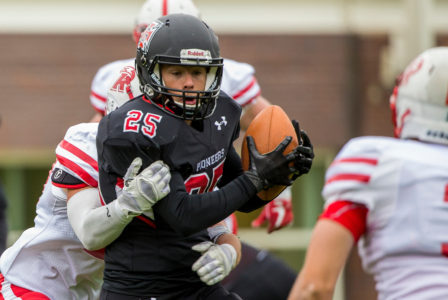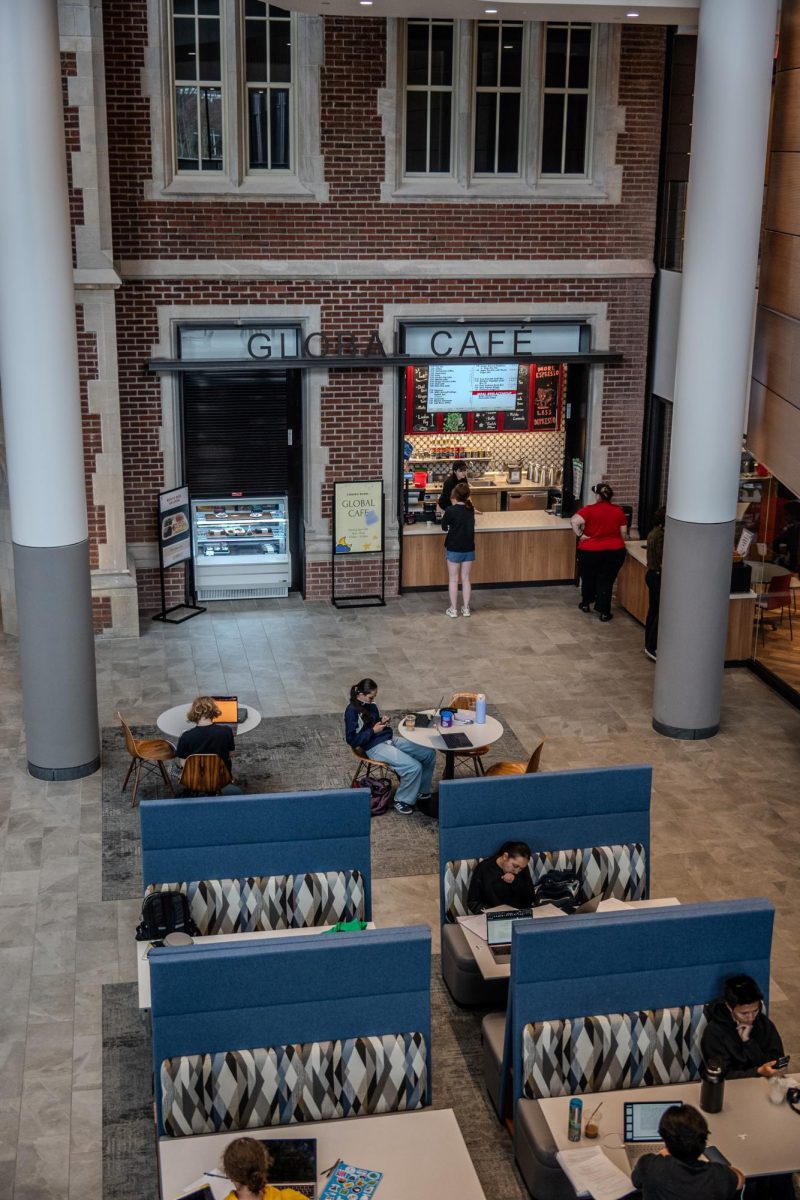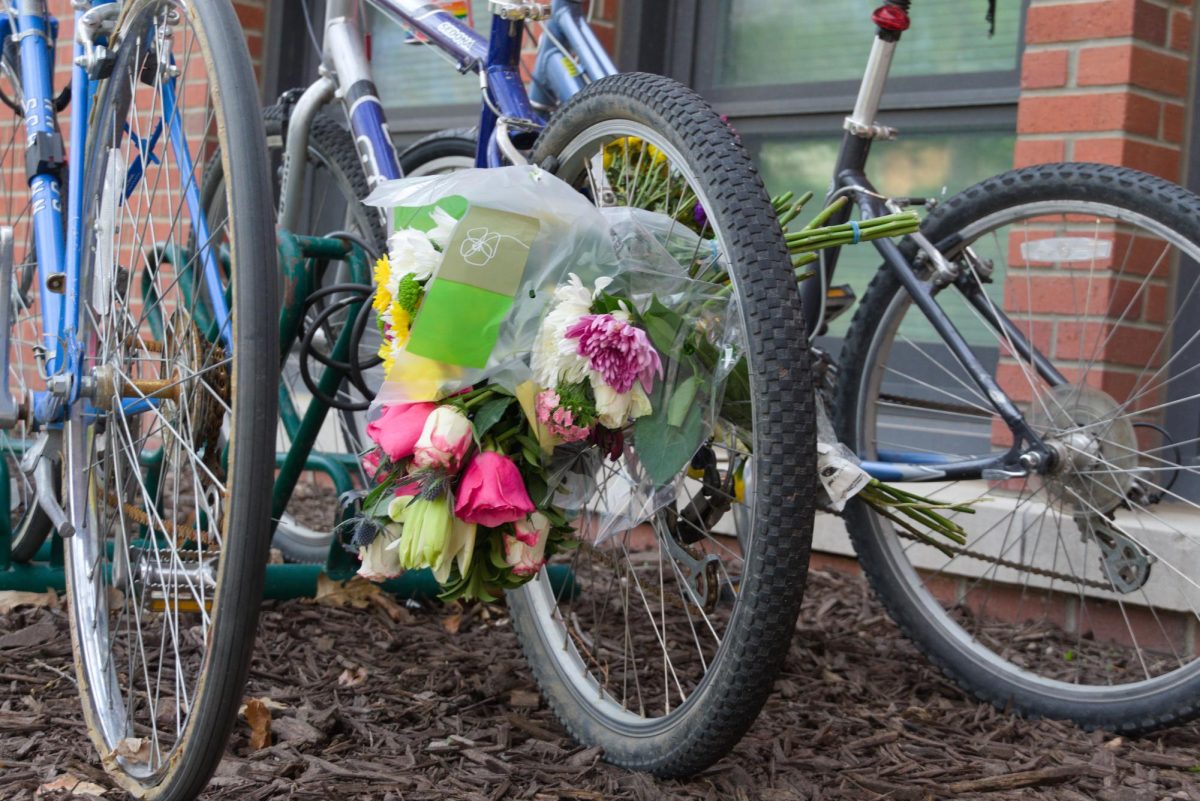
The Grinnell College football team’s season has come to an abrupt end, but the circumstances surrounding the historic cancellation decision will continue to have ramifications going forward. As reported in The S&B’s breaking coverage of the decision, the team’s roster had been reduced to just 28 uninjured players after a game against Macalester, making it unsafe for them to continue playing the season.
An all-campus email announcing the decision stated that “Grinnell College has made the decision to withdraw the football team from competitive play for the rest of the season to protect the health and safety of its student-athletes.” However, according to three fourth-year members of the team, the decision was not one made by the college, but rather by the students in defense of their teammates’ safety.
Max Hill ’20, Rick Johnson ’20 and David Taylor ’20 spoke to the S&B to give their account of the days leading up to the official cancellation announcement. According to them, they first began discussing the idea of withdrawing the team from competition after their game against Lake Forest College on September 14th. After a 42-3 loss against Macalester College, they held a team vote on whether or not to continue the season, with an overwhelming majority voting to withdraw from future games.
“We should have been competitive [against Macalester],” said Taylor, “and the seniors held the meeting in the morning and discussed the outcome and our primary concern for everybody’s safety.” No College personnel were present at the vote, according to the players interviewed. (Head Coach Jeff Pedersen had previously held a meeting where he’d informed them that the college would be supportive if they decided to cancel the season.)
On the loss to Macalester, Hill said, “It indicated that … proceeding with the rest of the season would be foolish, because of the size of [Grinnell’s] team and the degree to which St. Norbert, Monmouth, University of Chicago—they’re much better prepared and going there would essentially ensure injury.” The next game on the schedule was against St. Norbert College, a school with a top Division III football team and a roster of 125 players (the maximum allowed by the NCAA). Taylor said, “It was not to our knowledge that [the College was] going to stop us from playing Norbert.”
Grinnell’s team started with a 39-player roster this year, up from 38 players last year, but had 7 players with season-ending injuries and several more with injuries that would require their ability to play to be evaluated on a game-by-game basis. Three players were injured at the Macalester game, with the result that on the day of the vote, the team had only 28 players currently able to compete—just six more than the NCAA-required minimum. As a result of the shrinking roster, each individual uninjured player would have had to spend much more time on the field than usual in each game, significantly increasing the risk of injury.
The fourth years’ decision to hold a vote on cancelling the season was informed by a similar experience their first year, where the combination of a small roster and many injuries resulted in few available players by the seventh game of the season. That game was against Monmouth College, a team that, alongside St. Norbert, usually dominates the Division III Midwest Conference in football. “I tore my MCL playing in a game that shouldn’t have been played. … I kind of always had that in the back of my mind, that there’s no reason to have that situation happen to anyone else,” said Johnson.
Going forward, Hill, Johnson and Taylor want to see new policies put in place to keep players safe. According to Johnson, their introduction of the idea of cancelling the season was met with agreement that safety needed to be prioritized. “It was nerve-wracking, bringing up this idea—football means a lot to all of us, [it] brings a lot of joy to people, so to introduce the idea that we should give it up for the season was scary, but honestly, the meeting went better than I could ever expect. … It was an overwhelming majority in support [of the early season end]. It was nice knowing that it wasn’t just us,” he said.
The fourth years also want to make sure that the positive experiences they’ve had on the team can continue in future years. Hill said, “There’s a sense of camaraderie [on the team] … because even when we lose, we have this growth mindset, and it’s something that’s beautiful and very powerful, because when we come here, we do have a family. Just because we gave up the season doesn’t mean it changes, that we’re not going to be there for the younger guys on the team.”
For now, though, their primary focus is on creating a better way to keep players healthy and uninjured during the season. Johnson said, “It was the players’ decision to end the season. … It’s not about wins and losses for us— of course, it’d be great to win, that’s what we compete for—but it’s about the players’ safety, and right now, as a team, we don’t feel safe.”





























































Gregory Lee • Oct 12, 2019 at 4:52 pm
The players were smart to cancel the rest of the season. I’m concerned that the College would have allowed them to play even if they had wanted to. Which brings us to the real issue. How committed to the program is the Administration? It seems the program has suffered from benign neglect for years. Sure, the budget and facilities are there, but “commitment “ also means promoting a culture of support, not just saying “you guys want to play football? Here’s a ball, go play.” GC leadership needs to engage in some soul searching and decide how important football is to Grinnell. Forget competing with Monmouth or St Norbert. Playing a school with a 125 man roster is dumb. But let’s ask why GC isn’t drawing the same caliber of student athletes as the Carletons and Cornells out there. A good start would be to consider offering comparable aid packages. Don’t be cute by stating that you offer the same amount as those schools. We cost more, so that’s a false equivalency. I work in high school education and I know there is so much at Grinnell that would attract good players. Kids who can handle the academic rigor AND can run, block and tackle. The Pacific Northwest has dozens of small liberal arts programs where football is thriving. Find out what’s working. The College needs to make a commitment to football or it should put this once proud program out of its misery. “Sons of ‘ol Grinnell” deserve much better.